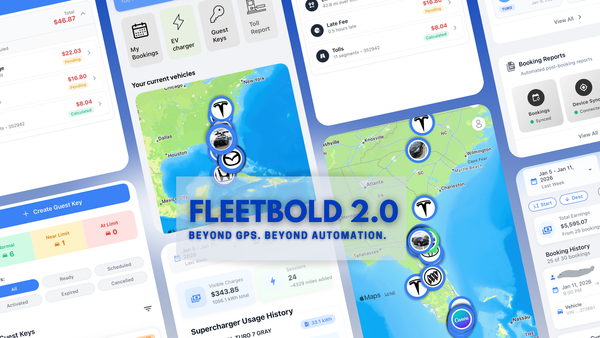Will Airbnb dethrone Turo in car rentals?
Discover how Airbnb’s expansion into the car rental market promises to reshape the way car rental enthusiasts book trips, empower hosts with new income streams, and foster seamless travel experiences supported by tools like FleetBold for efficient fleet management.

Introduction
For car rental enthusiasts, the arrival of Airbnb’s car rental offering marks an exciting turning point. Traditionally known for home sharing, Airbnb has set its sights on transportation, aiming to let hosts list vehicles alongside their properties. By integrating lodging and transportation in a single platform, Airbnb seeks to deliver unprecedented convenience for travelers and fresh revenue streams for hosts. In this extensive analysis, we examine why Airbnb views car rentals as its next big opportunity, how its inherent marketplace strengths and brand equity could disrupt the car rental industry, and what this means for existing peer‑to‑peer models like Turo. We also explore the benefits and challenges of this expansion, and consider the broader implications for the car rental landscape.
The Strategic Vision: Beyond Home Sharing
Airbnb’s leadership has long hinted at expanding “beyond travel” by adding complementary services to its platform. While short‑term lodging remains at its core, the company recognizes that cars are often the second most valuable asset travelers need after accommodations. By enabling hosts to list vehicles, Airbnb can transform into a true one‑stop travel marketplace. The vision is simple yet powerful: after booking a cabin or apartment, a guest can reserve transportation from the same host, eliminating the need to juggle multiple apps or agencies.
This strategic pivot builds on Airbnb’s proven marketplace model. Just as hosts supply spare rooms or vacation homes, they can now supply vehicles that would otherwise sit idle. The peer‑to‑peer approach requires minimal capital investment from Airbnb itself, since the company does not need to purchase or manage fleets. Instead, it leverages the assets of its existing community, applying familiar booking workflows, payment systems, and trust protocols to car rentals.
Timing and Market Opportunity
The timing for Airbnb’s car rental launch is favorable. Global travel demand continues to rebound, with more travelers seeking personalized experiences and digital convenience. Online car rentals already constitute one of the fastest‑growing segments in travel bookings, and the peer‑to‑peer model has demonstrated strong consumer interest. Younger travelers in particular favor platforms that allow them to book everything in a single flow.
Key market drivers include:
- Rising demand for integrated booking: Guests prefer seamless experiences where lodging, transportation, and even activities can be arranged in one glance.
- Underutilized assets: Millions of hosts own vehicles that remain parked for most of the day, representing an untapped supply for short‑term sharing.
- Post‑pandemic travel patterns: Travelers increasingly explore off‑the‑beaten‑path destinations, often requiring a car to access rural or suburban stays.
By capitalizing on these trends, Airbnb stands to capture a significant share of online car rental bookings while deepening engagement on its platform.
Leveraging Marketplace Strengths and Brand Equity
Airbnb’s greatest advantages lie in its scale, technology, and trusted brand. Unlike a newcomer, Airbnb already serves tens of millions of users worldwide. Introducing car rentals to this audience requires minimal marketing spend and benefits from strong network effects. Hosts who list both homes and cars can bundle offerings, making their listings stand out and attracting more bookings.
Moreover, Airbnb’s mature marketplace infrastructure secure payments, user verification, review systems, and customer support can be adapted to car sharing. The familiar six‑step booking flow reassures guests, while hosts enjoy protections backed by Airbnb’s guarantee programs. This proven framework reduces friction for both parties, encouraging rapid adoption.
By contrast, traditional rental car companies must invest heavily in digital transformation, and pure peer‑to‑peer platforms must build trust and scale from scratch. Airbnb’s head start gives it a distinct competitive edge in establishing a car rental marketplace at scale.
Benefits for Travelers
For car rental enthusiasts, Airbnb’s entry promises:
- One‑stop convenience: Book accommodation and transportation in a single reservation, with unified customer support and streamlined payments.
- Access to unique vehicles: Discover cars parked at your chosen property—everything from compact sedans for city breaks to SUVs for wilderness retreats.
- Trusted reviews and profiles: Leverage Airbnb’s two‑way review system to evaluate both hosts and vehicles before booking.
- Flexible pickup and drop‑off: Coordinate directly with hosts for personalized hand‑off arrangements, potentially including on‑site delivery at your rental.
This integrated experience can save time, reduce uncertainty, and elevate the overall travel journey.
Benefits for Hosts
Hosts benefit from Airbnb’s car rental feature through:
- Additional income: Monetize personal vehicles that would otherwise remain idle between trips.
- Enhanced listing appeal: Stand out by offering bundled home‑and‑car packages, potentially commanding higher rates and occupancy.
- Control over availability: Set custom pricing, minimum rental durations, and calendar synchronization to align with lodging bookings.
- Operational support: Utilize familiar platform tools messaging, payment processing, and protection programs to manage vehicle reservations.
- Data‑driven insights: Leverage rental metrics and analytics to optimize pricing and availability.
To streamline fleet operations, many experienced hosts already rely on third‑party software such as FleetBold. FleetBold provides GPS tracking, maintenance alerts, and real‑time telematics to help Turo hosts manage multiple vehicles efficiently. As hosts adopt Airbnb’s car rental feature, tools like FleetBold will prove invaluable in ensuring reliable, well‑maintained fleets and maximizing revenue.
Competing with Turo: A Comparison
Turo pioneered peer‑to‑peer car sharing, building a dedicated community of hosts and guests. Key Turo highlights include:
- Specialized vehicle offerings: From everyday cars to luxury and specialty models.
- Robust insurance options: Multiple protection plans up to high liability limits.
- Driver verification: Background and driving‑record checks to manage risk.
Airbnb’s model mirrors Turo’s core functionality but brings unique advantages:
- Integrated audience: Cross‑sell car rentals to existing lodging customers who may not have discovered Turo.
- Brand trust: Leverage Airbnb’s reputation for quality and customer care.
- Global rollout capability: Launch in dozens of cities simultaneously, driven by an established host network.
However, Airbnb must match Turo’s depth of car‑sharing expertise. Hosts and guests will expect comparable insurance, protection plans, and support. Airbnb can adapt its existing protection programs to cover vehicles, ensuring hosts feel secure listing cars and guests feel confident renting them.
Challenges and Considerations
Despite the promise, launching car rentals involves significant hurdles:
Insurance and Liability
Covering accidents, damage, and liability is complex. Airbnb must partner with insurers or expand its host protection program to include comprehensive auto coverage. Clear policies and protocols for handling incidents will be essential to gain host trust and comply with regulations.
Regulatory and Legal Hurdles
Local laws governing short‑term car rentals vary widely. Some jurisdictions may treat peer‑to‑peer platforms as traditional rental agencies, imposing fees or licensing requirements. Airbnb’s legal team will need to navigate these rules and work proactively with regulators to ensure compliance.
Operational and Technical Complexities
Key exchange, roadside assistance, and booking workflows for cars differ from homes. Airbnb must develop features for vehicle pickup and return whether through lockboxes, smart key systems, or in‑person hand‑offs. The app will need new search filters (fuel policy, mileage limits, transmission type) and integration with mapping services to guide renters.
Quality Control and Brand Alignment
Any negative car rental experience could reflect poorly on the Airbnb brand. Establishing minimum vehicle standards and host requirements will help maintain quality. Bad‑actor hosts or unsafe vehicles must be swiftly removed from the platform to protect brand integrity.

Implications for the Car Rental Industry
Airbnb’s expansion could catalyze broad changes:
- Heightened competition: Traditional rental car companies may accelerate digital innovation, improve pricing transparency, and form partnerships with peer‑to‑peer platforms.
- Market growth: Bundled home‑and‑car listings may attract new customers who previously skipped renting a car. Hosts supplying extra vehicles can increase overall supply, potentially leading to more competitive rates.
- Mainstreaming peer‑to‑peer: Airbnb’s massive reach can introduce car sharing to travelers who never considered it, driving greater acceptance of the sharing economy for vehicles.
- Ecosystem development: Demand for support services fleet management software, cleaning and inspection crews, on‑demand vehicle delivery may surge as car sharing becomes more common.
Conclusion
Airbnb’s foray into car rentals represents a bold bet on extending its marketplace beyond lodging into transportation. By harnessing its scale, technology, and trusted brand, Airbnb aims to deliver unmatched convenience for car rental enthusiasts while empowering hosts to monetize underutilized vehicles. Although challenges around insurance, regulations, and operational complexity remain, the potential rewards are significant for Airbnb, hosts, and travelers alike.
As the industry watches closely, one thing is clear: the convergence of home sharing and car sharing could redefine the travel experience. Enthusiasts will welcome new vehicle options and streamlined booking flows, while hosts will appreciate the opportunity to diversify their income. With tools like FleetBold supporting fleet operations, Turo hosts and new Airbnb host‑renters alike can manage their vehicles efficiently. In the coming months, we anticipate vibrant competition, innovative partnerships, and an overall better booking experience for anyone seeking to rent a car or a home or both from a single, unified platform.
The road ahead for Airbnb’s car rental venture is challenging but promising. Should Airbnb execute effectively, it will usher in a new era of one‑stop travel solutions, driving the car rental market into a future defined by integration, flexibility, and the power of community.





